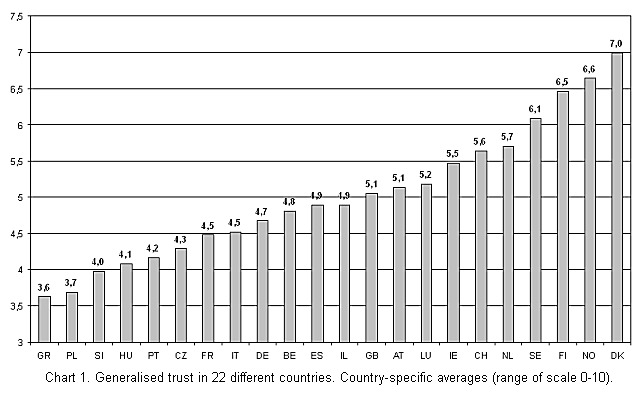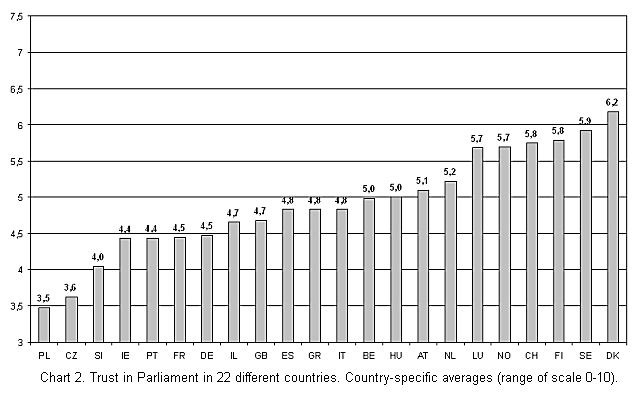 |
Issue 15 (3/2004)
|
|||
FSD Bulletin is the electronic newsletter of the Finnish Social Science Data Archive. The Bulletin provides information and news related to the data archive and social science research.
|
European Social Survey in the Research of Social CapitalAntti Kouvo 8.2.2005 Social capital is one the most popular concepts in social sciences at the moment. One database search alone revealed that in 2003 international social science journals published almost 300 articles with social capital as a title or search word. This article examines using the European Social Survey (ESS) to measure social capital. ESS is funded by the European Commission and covers 22 nations. Indicators of social capital in ESSSocial capital can be defined as a social resource which connects citizens to each other and enables a more effective pursuit of common goals. Social networks, norms (of reciprocity) and trust are often regarded as components of social capital. Social capital is a gratifying study subject for a researcher, as many of its indicators are established measurements which have been used for quite a long time. On the other hand, the concept can be applied to an astonishing number of diverse components. The ESS data include many variables which are relevant to the research on social capital. I will now examine some most commonly used variables. An individual's attachment to networks can be studied by surveying involvement in voluntary organisations. ESS variables cover the level of participation in different kinds of organisations, from membership to voluntary work. If one is interested in social activities outside voluntary organisations, one can use variables that cover, for example, social networks (frequency of meeting friends and relatives). The moral dimension of social capital can be charted by using questions pertaining to what are the qualities of good citizens. Variables traditionally used in predicting social capital are also represented in the ESS, including general satisfaction with life and different forms of time use such as reading newspapers, watching television and using the Internet. But then again, such an extensive survey as the ESS contains many other variables which can be used to measure different aspects of social capital. Recent trends in the research on social capital have included, for example, the study of ethnic issues and the study of attitudes to health and the welfare state. ESS data have a lot to offer in this respect. Trust in European countriesOne of the most common indicators of social capital is the level of trust. ESS contains variables which measure trust in other people and institutions. One of the most essential types of trust is the so-called "generalised trust" which refers to trust in strangers. In attitudinal surveys, this is often measured with a scale that has been used since the 1950s. The ends of the scale are labelled "generally speaking most people can be trusted" and "you can't be too careful in dealing with people". Despite the criticism that the scale has attracted, the trust indicator has established itself as a relatively unambiguous measurement of social capital at the level of society, as it is considered to indicate an individual's trust in things outside his/her closest circle. In the ESS, generalised trust has been measured with three statements: other people can be trusted, people are generally fair, and people are generally helpful. Contrary to other surveys, a linear, numeric scale of 1 to 10 is used, which allows researchers to choose an analysis method suitable for their needs. Next, I will take a look at variation in the level of trust in countries participating in the ESS. I use weight variables which account for structural and size differences between the countries. This is an essential procedure in cross-national surveys. In the data, both weight variables are presented as separate variables and are quite easy to use.
Chart 1 displays the variation in generalised trust between countries. The results reinforce the view that the Nordic countries enjoy a high level of generalised trust, whereas in many Southern European countries the level of trust is lower than average. Variation is not limited to the north-south axis; when the average of the aggregated data is weighted to population, the former Eastern bloc nations are found to have a low level of trust. In addition to generalised trust, trust in institutions is regarded as a fundamental promoter of social capital. Together with generalised trust and citizen participation, it enhances social interaction which contributes to the growth of social capital. ESS has measured trust in national institutions such as Parliament, the legal system, the police and politicians. International institutions covered by the data are the European Parliament and the United Nations. Chart 2 displays country-specific averages of trust in Parliament. The average of the aggregated data is 4.63 when weighted to population. The result is almost the similar as in chart 1, but more ambiguous. The Nordic countries are still high up on the scale, but the order of countries in the lower half is less dependent on geographical or historical factors. Variation may partly be a consequence of political trends. On the other hand, many researchers have emphasised the institutional dimension of social capital, especially in the Nordic countries.
Abbreviations of countries: ESS allows new approachesAs social capital has began to be established as an independent field of research, demands for more systematic approaches have increased. The chances for systematic research have improved considerably. On account of its wide coverage and meticulously designed measurements, the ESS is a useful tool for research on social capital, also from new points of view. The second round (to be published in 2005) will include variables covering economic morality, and trust in public officials, financial institutions, plumbers, builders etc.
|

